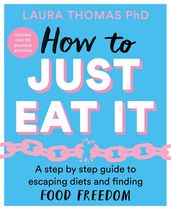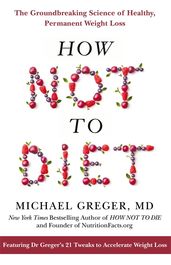Books to help you reset your relationship with food
Ali Roff Farrar shares three books to help you change your relationship with food, from intuitive eating guides to scientifically backed studies. If you want to know how to stop counting calories and reduce anxiety around food, look no further.

Our relationship with food is complex; from emotional connections to addictions, and even the way it can affect our feelings self-worth. But when it comes to nutrition and our approach to it, what do we really need for a healthy mind and body? Here, Ali Roff Farrar shares three books from the experts, which will help you reset your relationship with food once and for all.
How to Just Eat It
by Laura Thomas
Nutritionist and bestselling author of Just Eat It Laura Thomas PhD is back with How to Just Eat It. She uses the principles of intuitive eating, from mindful eating practices and understanding hunger and what it feels like to be full, to focusing on changing our mindset, in order to develop a judgement-free approach to food. Laura also helps us to understand and spot diet culture in the media and society. Her wonderful practice called ‘Diet Culture Bullsh*t Bingo’ involves spotting phrases such as ‘burning off food’, ‘cleanse’ and ‘80/20 rule’ to help understand and learn to identify diet culture (and how it affects us) in everyday life, social media, TV and even our own language.
Try this: ‘Understanding emotional eating’ from How to Just Eat It by Laura Thomas PhD
‘In your journal, write out all the functions that food has served over the years that you have labelled as ‘emotional’, ‘stress’, or ‘comfort’ eating.’ For example, celebration, self-soothing, dealing with loneliness. ‘Next to each one, write down any associations or memories you have with food. Did this give you any clues as to your own unmet needs?’
The Last Diet
by Shahroo Izadi
‘A story of a young person who learned to dislike themselves and grew into an adult who had become accustomed to punishing their body.’ Sound familiar? Behavioural Change Specialist Shahroo Izadi knows this story only too well, having been through her own journey of weight loss by changing habits and dealing with food addiction, rather than punishing herself through dieting. In her second book The Last Diet (which follows her brilliant debut The Kindness Method), Shahroo promises no more diets: ‘I’m going to show you how to enjoyably manage your weight for the rest of your life, and I’ll do it without telling you what to eat.’ Instead, her focus is self-worth. Bringing together addiction treatment and tools to help build low self-esteem and banish negative self-talk, Shahroo provides tools to help you make choices based on self-love, rather than self-hate. ‘Starting to be kinder to yourself immediately (regardless of your weight) will make weight-loss goals easier to achieve.’
Try this: Written Exercise: ‘My Body Deserves’ from The Last Diet by Shahroo Izadi
Start learning to love and care for your body rather than punishing it for not meeting standards by journaling some new habits which are non-diet related. ‘Note down some suggestions of new self-care habits you could adopt to treat it [your body] with more gratitude. Ones that may not be directly related to diet or exercise. Anything from deciding to play music to please your ears while you do household chores to booking yourself a regular massage to thank your muscles.’
How Not to Diet
by Michael Greger MD
Renowned nutrition expert, physician and founder of the NutritionFacts website Dr Michael Greger delivers the ground-breaking science of long-term weight loss in easy to understand language. How Not to Diet is a fascinating read, jam-packed with interesting science to help you understand how to approach food and your body using scientific fact, and how to debunk many of the diet culture myths we’re regularly fed. For example, Greger explains: ‘the ‘fat gene’ you may have heard about (called FTO, short for ‘FaT mass and Obesity associated’) is the gene most strongly linked to obesity, but it explains less than 1 per cent of the difference between people (a mere 0.34 per cent). FTO codes for a brain protein that appears to affect your appetite . . . to result in a difference in intake of a few hundred extra calories a year, while what it took to lead to the obesity epidemic is more like a few hundred calories a day. Obesity does tend to run in families, but so do lousy diets.’ The conclusion? Diet trumps genes! It also ventures into fascinating theory around the modern impact of easily available food, alongside our evolution in which we were hardwired in a time of scarcity to consume every available calorie. Plus, for ultimate support, Greger’s How Not to Diet Cookbook supplements his scientific-based approach with 100 specially designed recipes for healthy weight loss.
Try this: ‘Breaking Bad . . . Habits’ from How Not to Diet by Michael Greger
It’s easy to form, and much harder to break, bad habits around food. ‘The first time you snacked in front of the TV at night, you may have been genuinely hungry, but over time, the two activities can become indelibly linked such that your prime-time shows trigger snack cravings even if you’re not really in the mood to eat. It can become something you can’t help—in other words, a bad habit.’ To break these habits you can ‘change the cue, or change the action.’ Changing the cue may mean that ‘If you’re used to having a cookie every time you see the cookie jar, it might be better to replace it with a fruit bowl.’ Whereas changing the action means actively choosing a new behaviour, for example ‘If I get hungry after dinner, I will eat an apple.’
*Weight Loss and Weight Management Diet Market by Product Type (Better-for-you, Meal Replacement, Weight Loss Supplement, Green Tea, and Low-calorie Sweeteners) and Sales Channel (Hypermarket/Supermarket, Specialty Stores, Pharmacies, Online Channels, and Others): Global Opportunity Analysis and Industry Forecast, 2021–2027, Himanshu Vig , Roshan Deshmukh, June 2020


